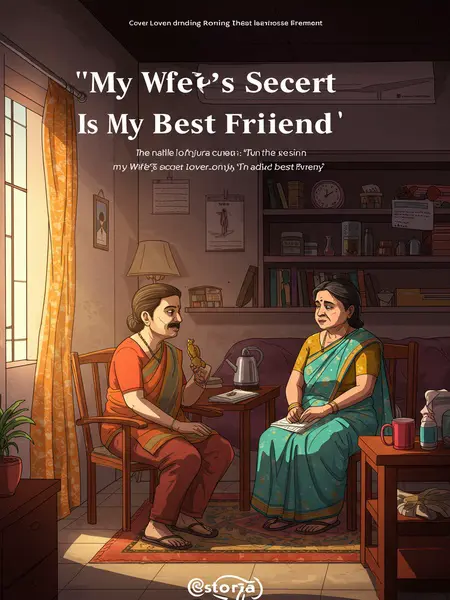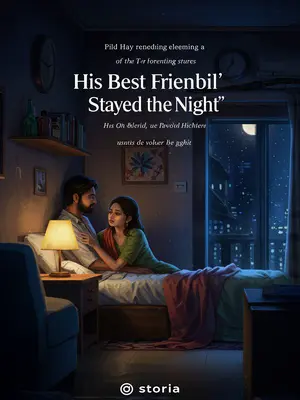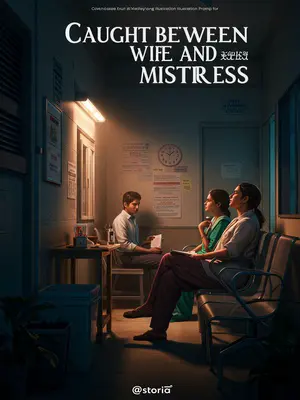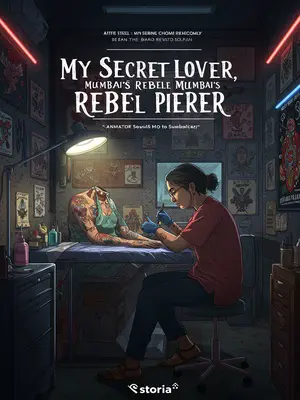Chapter 1: The Suitcase and the Lemon-Chillies
Packing my wife’s luggage for her two-week business trip, my hand brushed against a folded hospital slip and a crumpled discharge paper, hidden under Ananya’s silk dupatta—something that didn’t belong there.
The late morning sunlight poured through the bedroom window, glinting off the glossy suitcase as I neatly folded Ananya’s formal kurtis and tucked in her laptop charger. That’s when my fingers found those two slips of paper, nestled between her favourite silk dupatta and an old bank statement. My heart thudded, a queasy twist in my stomach, as if some ancient evil eye had just passed over our flat. I glanced at the tiny lemon and chillies we’d hung on the main door last month—clearly, not enough.
Both documents clearly stated that my wife had been hospitalised for seven days due to a miscarriage.
My fingers trembled, smudging the blue hospital stamps. One paper had that familiar government hospital smell—antiseptic, old fans, and dust—hit me. It always made my head spin, like waiting hours in the OPD with Amma. I squinted at the handwriting, as if the words would change if I stared hard enough. Seven days. Miscarriage. It felt surreal, like one of those filmi plot twists you scoff at but never expect to crash into your own living room.
But damn it, I’ve always used protection.
For a moment, the entire world shrank to the four corners of our cluttered bedroom. Outside, the sound of the pressure cooker’s whistle from the neighbour’s flat reminded me I was still here, feet planted on cold marble tiles, trying to make sense of something that simply could not be true. In my head, a stubborn voice insisted—this was not my fault. It couldn’t be.
Clutching those two wrinkled pieces of paper, my mind was in a whirl.
I sat down heavily on the bed, the mattress letting out a tired creak under my weight. My legs felt numb. Above the hum of the ceiling fan, I could almost hear the echo of my own thoughts running wild. My chest was tight, as if someone had pressed a grinding stone on it. These hospital records—real, official, cold. But how could they be? I tried to remember every single moment from the last few months, but everything got jumbled up in my mind.
A child? A miscarriage?
I kept staring at the word ‘miscarriage’, as if expecting it to fade away. There was a time when that word would’ve meant heartbreak. But now? My brain simply refused to process the possibility. How could this have happened? To us?
My first reaction was: Impossible.
I looked around, searching for some sign that this was just a bad dream. The calendar on the wall, our wedding photo on the shelf—everything looked normal, yet nothing felt right. I told myself, there must be a mistake. This cannot be our story.
My wife, Ananya, and I have been married for seven years. We’ve always wanted a child, but Ananya has a clear career plan. She always says there’s still room for her to grow professionally.
In the first couple of years, both our mothers would drop hints—little things, like suggesting ladoos to boost fertility or asking if we’d seen a good gynaecologist. I remembered Ma pushing a bowl of hot ghee ladoos into my hands, whispering, “Eat, beta, good for making babies,” while Ananya rolled her eyes behind her back. Ananya would always smile politely, but after everyone left, she’d sigh and say, “There’s still time, na? I’m just starting to make a mark at work.” I knew what that meant. She wanted to climb higher, and I respected her for that. In this country, it’s not easy for women to dream big, let alone chase those dreams.
If she had a child now, her career would likely come to a halt. So we agreed: no kids until she turned thirty-five and secured her place at the company.
Our pact felt right, a little bubble of understanding between us. Whenever relatives tried their usual emotional blackmail, Ananya would squeeze my hand under the table, her eyes meeting mine, and I’d step in to save the day.
Fine, I understood. It’s not easy for women in the workplace. If pregnancy and breastfeeding held her back, all her previous efforts would go to waste.
I had seen my own sister forced to quit her job after she got married, then again after her first pregnancy. The sacrifices Indian women make just to have a career—only they know. I never wanted Ananya to feel trapped like that.
So, facing pressure from both our families to have children, I took it all on myself. I told both sets of parents that I had low fertility, and having a child wouldn’t be easy. Only then did the families finally quiet down.
I still remember that evening, my father’s face frozen in shock and my mother dabbing her eyes with her saree pallu, whispering to my aunt, “Beta bechara, what to do, God’s will.” Ananya looked at me then, a mix of guilt and gratitude. I shrugged it off, made a joke about karma, and changed the topic to cricket. From then on, no one bothered us about kids.
Since we weren’t planning on having kids yet, I always took precautions during sex, afraid Ananya might accidentally get pregnant and jeopardise her job.
I was meticulous, bordering on paranoid. Durex boxes stashed in every drawer, reminders on my phone for refills, even silent prayers before each time. I didn’t want any slip-up—my wife’s dreams were at stake.
So I’m certain: she couldn’t have gotten pregnant by me.
That fact hit me again, sharp as a slap. If she did get pregnant, it wasn’t my doing. So whose?
Then why were there a prenatal check-up slip and a discharge record in Ananya’s suitcase? Wasn’t she on a business trip for the past two weeks?
I tried to recall—her flight ticket, WhatsApp location, the selfies she sent from the hotel room. Was all that just a cover?
I didn’t have time to think. With trembling hands, I called Ananya.
The phone rang twice before disconnecting. My thumb left a sweaty print on the screen. In the silence, the kitchen clock ticked louder than ever.
As usual, she didn’t answer. Instead, after the call was cut off, she sent me a single question mark: “?”
That tiny symbol glared back at me, colder than a Delhi winter morning. Just a question mark. Not even a ‘hello’ or a ‘busy, call you later’. As if my call was an interruption, not a concern.
Seeing that question mark was like a bucket of cold water poured over my head—shock and shame mixing together. I instantly calmed down.
It’s amazing, the way a single punctuation mark can drain the rage out of you and replace it with a strange, steely resolve. My anger evaporated, replaced by a hard, numb clarity. I needed answers, not drama.
No, first I need to confirm if the prenatal check-up slip and discharge record are real.
No point accusing someone without proof—my mother always said, "Before raising your finger, be sure your own hands are clean." I wasn’t sure about anything right now, so I needed to check every detail.
Although it’s unlikely Ananya would fake two hospital documents for no reason, what if?
Maybe there’s some logical explanation. Maybe she collected these papers for a friend or something. My mind desperately searched for loopholes.
I still held onto a sliver of hope.
Hope clung to me, thin as the last thread on an old gamcha. I dialled the number, praying for some mistake in the records.
So I looked up the contact information for the Women and Children’s Hospital in Pune and called.
My voice cracked as I spoke to the receptionist, stumbling over Ananya’s full name and date of birth. She put me on hold, a film song playing tinny through the line.
They confirmed that Ananya was indeed discharged from their hospital a week ago. It was for an abortion. The foetus was already three months old at the time.
The word ‘abortion’ echoed in my ears, louder than the auto horns outside. Three months? My mind struggled to add up the weeks, the dates, my own whereabouts. It didn’t make sense—unless… unless…
My mind went blank. I don’t even remember how I hung up.
All I remember is my own reflection in the bedroom mirror, pale and lost. I tried to swallow, but my throat was dry as a summer well.
“Did you call for something?”
Her message pinged, breaking my trance. The screen glowed with her words, so casual, so normal.
Maybe because I hadn’t replied for a long time, she tentatively sent another message.
I could almost picture her face—cool, composed, eyebrow arched in mild annoyance. That’s always been her style: never flustered, always a step ahead.
I know Ananya too well. She’s been cold to me for the past two years. No matter how much I tried to please her or even yelled in frustration, it was hard to get any reaction. She never took the initiative to contact me, and whether she answered my calls depended on her mood.
Some nights I’d make her favourite chai, bring home jalebis, try to start a conversation, but she’d be buried in work emails, barely looking up. Her laughter had become a rare event, her words mostly limited to instructions or complaints.
If Ananya really had a clear conscience, she’d just ignore my call, not actively probe with a message.
I read between the lines: she’s nervous. Why else would she bother checking on me?
I snapped photos of the prenatal check-up slip and discharge record as evidence, then put them back exactly where I found them in her clothes.
Carefully, I straightened out the folds, made sure her suitcase looked untouched. If she suspected anything, I’d never get the truth.
Then I replied to her message: “Nothing, just wanted to ask which of the clothes you brought back from the trip need washing.”
I tried to sound casual, like a clueless husband more concerned about laundry than secrets.
Ananya replied almost instantly: “Don’t touch my suitcase. I’ll handle it myself when I get back.”
There it was again, that urgency, as if my fingers were poison to her secrets. I stared at her reply, feeling the air go cold.
Looking at her message, my heart felt like someone had poured a bucket of cold water over me—shock and shame mixing together.
For a moment, the flat seemed smaller, suffocating. The ceiling fan’s whir sounded like an accusation. I sat there, gripping my phone, trying to process the depth of this betrayal.
I stared at the suitcase, my world balanced on the edge of a secret I was never meant to find.













